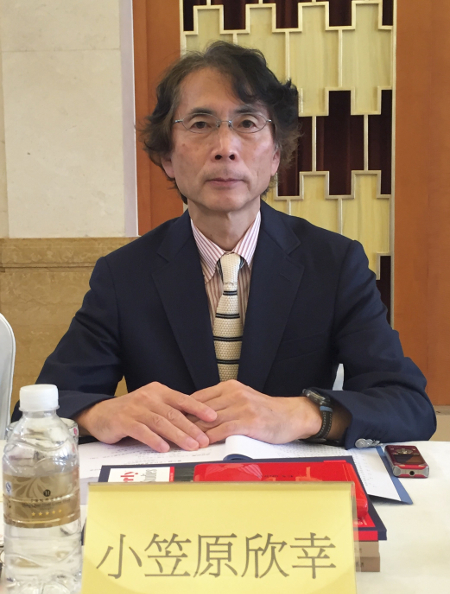 小笠原欣幸为东京外国语大学大学院综合国际学研究院副教授。专门研究台湾政治丶台湾的选举丶两岸关系,在日本发表〈2016年台湾总统丶立法委员选举分析〉丶〈从地方基层解读台湾的选举:以云林县为案例的研究〉丶〈从马英九的博士论文解读日台渔业谈判〉丶〈中国对台政策的发展:从江泽民到胡锦涛〉丶〈2008年台湾总统选举分析〉等学术论文。经常访问台湾,访谈许多朝野政治人物包括总统丶立法委员丶县市长丶议员以及村里长。
小笠原欣幸为东京外国语大学大学院综合国际学研究院副教授。专门研究台湾政治丶台湾的选举丶两岸关系,在日本发表〈2016年台湾总统丶立法委员选举分析〉丶〈从地方基层解读台湾的选举:以云林县为案例的研究〉丶〈从马英九的博士论文解读日台渔业谈判〉丶〈中国对台政策的发展:从江泽民到胡锦涛〉丶〈2008年台湾总统选举分析〉等学术论文。经常访问台湾,访谈许多朝野政治人物包括总统丶立法委员丶县市长丶议员以及村里长。Full Text
簡体字 / 正體字 / English摘要:
本文试图分析蔡英文政府上台後的两岸关系丶台北和北京的动态,以及初步评估美国川普政府将带给台湾的冲击。
2016年1月总统选举後,台湾政权从推进两岸关系融合的国民党马英九移转至强调「台湾认同」的民进党蔡英文手中。希望维持「台湾现状」的蔡英文和为实现「中国梦」试图不断推动两岸统一的习近平之间鸿沟甚深,两岸关系因此陷入了胶着状态。
中国对不承认「一个中国」的蔡英文政府感到焦虑,对台湾施压力度越来越大,而蔡英文则冷静应对。虽然蔡政府的支持率有下降趋势,但是蔡政府的支持基础并没有因为两岸关系的冷淡而动摇。中国方面也欠缺决定性的力量,陷入瓶颈状态。因此双方保持着微妙的平衡。
在这种情况下,美国川普当选总统,左右着台湾方向的美中关系的未来变得完全不透明。蔡英文对川普的言论避做评论,并且行动低调。
虽然台湾作为弱势的一方,一直被操弄在美中博弈之下,历尽艰辛,不过台湾依然拼命努力生存。台湾正在风暴中谨慎地向前行走。
摘要:
本文試圖分析蔡英文政府上台後的兩岸關係、台北和北京的動態,以及初步評估美國川普政府將帶給台灣的衝擊。
2016年1月總統選舉後,台灣政權從推進兩岸關係融合的國民黨馬英九移轉至強調「台灣認同」的民進黨蔡英文手中。希望維持「台灣現狀」的蔡英文和為實現「中國夢」試圖不斷推動兩岸統一的習近平之間鴻溝甚深,兩岸關係因此陷入了膠著狀態。
中國對不承認「一個中國」的蔡英文政府感到焦慮,對台灣施壓力度越來越大,而蔡英文則冷靜應對。雖然蔡政府的支持率有下降趨勢,但是蔡政府的支持基礎並沒有因為兩岸關係的冷淡而動搖。中國方面也欠缺決定性的力量,陷入瓶頸狀態。因此雙方保持著微妙的平衡。
在這種情況下,美國川普當選總統,左右著台灣方向的美中關係的未來變得完全不透明。蔡英文對川普的言論避做評論,並且行動低調。
雖然台灣作為弱勢的一方,一直被操弄在美中博弈之下,歷盡艱辛,不過台灣依然拼命努力生存。台灣正在風暴中謹慎地向前行走。
Abstract:
This paper analyzes the development of China-Taiwan relations since the DPP’s Tsai Ing-wen took office in May 2016, and tries to make a preliminary estimation of the impact of the new U.S. Trump administration on Taiwan.
Since the presidential election in January 2016, the administrative power in Taiwan was transferred from the hand of Ma Ying-jeou who promoted the friendly policies toward China to that of Tsai who emphasized “the Taiwanese identity” and "the status quo of Taiwan". The gap between Tsai Ing-wen and Xi jinping, who was unceasingly promoting “Chinese Dream” for which the unification was indispensable, was so wide that the relations between Taiwan and China reached a stalemate.
As Tsai didn’t accept “One China,” China’s ill feeling toward Tsai intensified and China’s pressure on Taiwan increased. Tsai handled the situation with caution. Even though the approval rating of Tsai fell considerably, this was mainly due to domestic issues, not to the freezing relations with China. On the other hand, China didn’t have the decisive power to solve the Taiwan issues. For that reason, Taiwan and China kept a very subtle balance.
The advent of the Trump administration added another uncertainty to US-China relations and put Taiwan in the far more difficult situation. Tsai refrained from commenting on Trump’s remarks and kept a low profile.
Although Taiwan has always suffered from being in the weak position, it has managed to survive. As it did in the past, Taiwan sails in the storm cautiously.